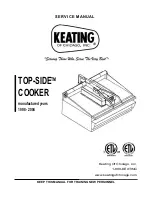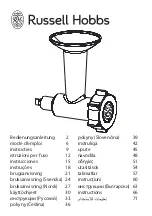
Failure to unplug the appliance could result in electrical shock or personal injury.
PROBLEMS WITH YOUR WINE COOLER
You can solve many common wine cellar problems easily, saving you the cost of a possible service call. Try the
suggestion below to see if you can solve the problem before contacting Vinotemp at
TROUBLESHOOTING
PROBLEM
POSSIBLE CAUSE
Door will not close properly
•
The wine cellar is not level.
•
The shelves are out of position.
•
The door gasket is dirty.
•
A bottle in the cellar is too long.
Wine cooler does not
operate
•
Ensure unit is plugged into the wall socket/electrical outlet.
•
Make sure the wall socket has power. If outlet is controlled by
a wall switch, make sure switch is set to on. Test wall socket
functionality by testing another electrical appliance in the
power socket.
Power is ON but the unit will
not cool
•
Make sure there are at least 3 to 5 bottles in the unit. When
using the unit for the first time, it can take up to 24 hours to
reach the desired temperature.
•
If the room temperature is at the high end of the ambient
temperature range, it may have more difficulty achieving a low
internal temperature.
•
To achieve accurate temperature control, the unit should not
be used or operated in any of the following locations:
•
In a sunny place, a room with poor air circulation such as a
garage or near another heat-producing appliance such as a
dishwasher, oven or refrigerator.
•
With an outlet shared with a refrigerator, as the refrigerator will
drain power from the wine cellar.
•
Make sure the cooler has proper clearances at side and rear
and is located in a well-ventilated area.
•
Door is not closed tightly or is being opened too frequently.
Fan is always running
•
This is simply a function of the cooling system. The lower the
setting, the more the fan will run. If the room is very warm, the
cooler will run more.
•
The unit has been designed to run continuously when
operating at the lower temperatures.
Vibrations
•
Check to make sure the wine cooler is level.
•
The rattling noise may come from the flow of refrigerant.
•
As each cycle ends you may hear gurgling noises caused by
the flow of the refrigerant. This is normal.
•
Contraction and expansion of the inside walls may cause
12
0









































